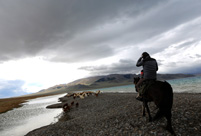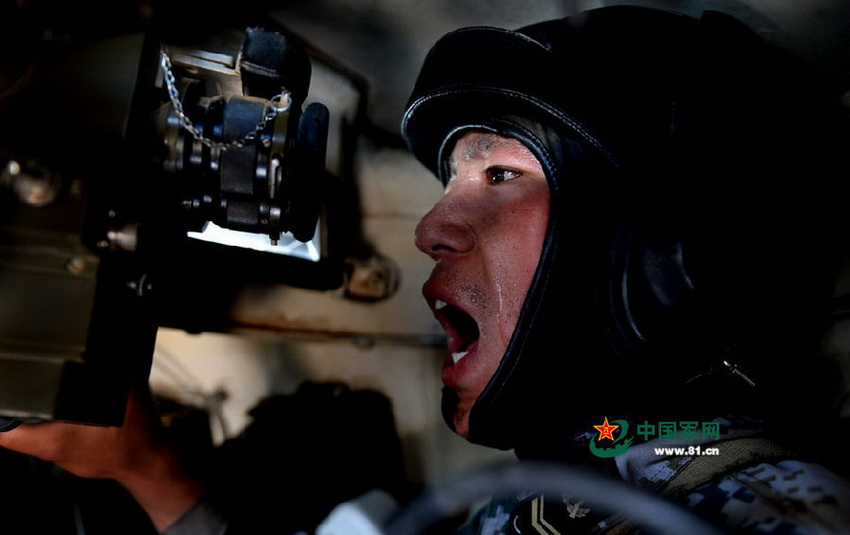 Not afraid of death
Not afraid of death
 Chen Guangbiao ads on A15 of NYT to host charity luncheon for 1,000 poor and destitute Americans
Chen Guangbiao ads on A15 of NYT to host charity luncheon for 1,000 poor and destitute Americans
 Passionate bar babies and fans feel the charm of World Cup 2014
Passionate bar babies and fans feel the charm of World Cup 2014
 US aircraft carrier docks in HK, welcomes PLA aboard
US aircraft carrier docks in HK, welcomes PLA aboard
 Graduation season: 'Take graduation photos to mark our love'
Graduation season: 'Take graduation photos to mark our love'
 College-student-turned nun becomes famous on Internet
College-student-turned nun becomes famous on Internet
 Japanese airplanes tail Chinese warplane in China's ADIZ
Japanese airplanes tail Chinese warplane in China's ADIZ
 China applies for UNESCO listing of Nanjing documents
China applies for UNESCO listing of Nanjing documents
 Picturesque scenery in Hongcun Village
Picturesque scenery in Hongcun Village
 Japan's PM vows to resume commercial whale hunt
Japan's PM vows to resume commercial whale hunt
The Republic of Korea is bracing for the worst in its ties with Japan, as the Abe administration is set to disclose the results of its controversial scrutiny into the background of the Kono Statement, one of Japan's key apologies for its wartime atrocities.
In the statement, issued in 1993 by then-chief cabinet secretary Yohei Kono, the Japanese government acknowledged for the first time that the Japanese Army was involved in forcing women from Korea and elsewhere into sexual slavery during World War II.
The statement is regarded by Seoul as one of the cornerstones of its relationship with Tokyo, as it reflects the true historical perspective that the ROK expects of Japan. Japanese Prime Minister Shinzo Abe has officially pledged to respect the statement. But at heart, he does not believe in it. He views it as something that stands in the way of realizing his vision, says a commentary of the Korea Herald.
Abe's dream is to make Japan "a beautiful country", a country that has done nothing shameful and therefore deserves the love and respect of young Japanese.
Abe is seeking to undercut the statement, which apologizes for Japan's wrongdoings and acknowledges the shame, without officially disavowing it. In February, he launched a five-member panel to find out how the statement was compiled, with the intention of showing it was not based on facts.
Earlier this week, Japanese media outlets reported that the Tokyo government might announce, based on the panel's findings, that the statement was the result of mediation between the ROK and Japan.
Such an announcement would seriously undermine the credibility of the statement, as it would introduce the claim that Japan's 1993 apology was based not on historical facts but on some kind of political bargaining with the ROK.
The reports from Tokyo have understandably put Seoul on edge. And ROK officials have pointed out that the Kono Statement was based on a study conducted by a Japanese government-commissioned research team,
They also warned that, should the Japanese government make an announcement that erodes the statement, the Seoul government would disclose historical documents proving the involvement of the Japanese government and military in running frontline brothels.
Abe should make a wise decision and not undermine the statement so as to avoid further alienating Japan from the rest of the countries in the region.
 Puzhehei: land of idyllic beauty
Puzhehei: land of idyllic beauty Chinese navy fleet visits Cape Town, South Africa
Chinese navy fleet visits Cape Town, South Africa PLA naval cadets toss their hats at graduation ceremony
PLA naval cadets toss their hats at graduation ceremony Graduation photo ideas: reliable alumnus and happy alumna
Graduation photo ideas: reliable alumnus and happy alumna Super daddies in 2014 World Cup
Super daddies in 2014 World Cup College girls take stylish photos to help enrollment
College girls take stylish photos to help enrollment Rebuilding the silk road
Rebuilding the silk road Top 10 Chinese products scoring World Cup goal
Top 10 Chinese products scoring World Cup goal PLA units hone their tank combat skills
PLA units hone their tank combat skills In Pictures: Female fans of World Cup
In Pictures: Female fans of World Cup China's top 10 representative architectures
China's top 10 representative architectures Photo story: A day of 'mini girl'
Photo story: A day of 'mini girl' Top 20 hottest women in the world in 2014
Top 20 hottest women in the world in 2014  Cute animals' leisure summer in zoo
Cute animals' leisure summer in zoo Exhibition of the Buddha held in Tibet
Exhibition of the Buddha held in TibetDay|Week|Month